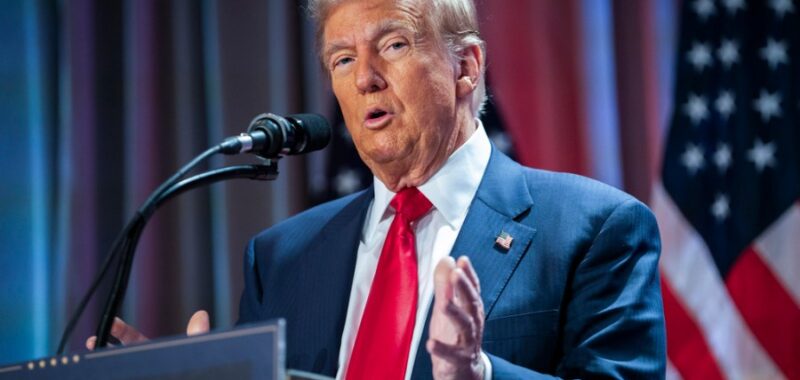
Among the many surprising moments at President-elect Donald Trump’s campaign rallies this year were his repeated declarations that he should be awarded the Nobel Peace Prize.
Last month, Trump stood on a stage in Las Vegas and declared, “They gave Obama the Nobel Prize … He got elected and they announced he’s getting the Nobel Prize. I got elected in a much bigger, better, crazier election, but they gave him the Nobel Prize.”
On the campaign trail, Trump often mentioned being nominated for the Nobel Prize — the last time in October 2024 by a member of the House of Representatives. His previous nominations have focused on his Middle East diplomacy, his effort to bring about diplomatic normalization between Kosovo and Serbia, and for his outreach and summitry with North Korean leader Kim Jong Un.
As extraordinary as these declarations may seem, Trump could actually win the Nobel Peace Prize. As a candidate in the context of Russia’s war against Ukraine, he has confidently declared that he would end the war in a day. If he could bring the war to a just, durable peace — with a security guarantee for Ukraine — that would indeed be Nobel Prize-worthy.
And that wouldn’t be the only opportunity. Trump has solid prospects to bring a Nobel Peace Prize back to Mar-a-Lago, starting with ending wars in Ukraine and between Armenia and Azerbaijan. In addition, he could use his influence with Israeli Prime Minister Benjamin Netanyahu and the Saudi Arabian leadership to stop the war in Gaza. Finally, Trump might also qualify for a Nobel if he engineers the peaceful removal of Nicolas Maduro from Venezuela and the successful inauguration of the newly — and fairly — elected president Edmundo Gonzalez.
To bring about real peace in Ukraine, Vladimir Putin must be convinced that he can’t win, that time isn’t on his side. Two weeks ago, I was in Ukraine meeting with government officials, parliamentarians, and civil society leaders, and it became clear that the Ukrainians are not confident time is on their side, because of manpower shortages in the military and society.
Though they will fight as long as it takes, because for them the war is existential, it felt like they were ready for peace. The autocratic Russian government, on the other hand, even before Trump’s victory, appears to be under economic pressure and reluctant to issue another large mobilization of Russian personnel, but Putin remains convinced he can outlast Ukrainian President Volodymyr Zelensky and his international supporters.
Trump will have the power and the credibility with Putin to tell him he must make a just, lasting peace. He can threaten to continue arming Ukraine if Russia doesn’t play ball. He also could credibly convince Ukraine to forfeit territory in exchange for a bilateral U.S. security guarantee (like the one we have with Japan and South Korea) or NATO membership; given broad bipartisan support for Ukraine in the Senate and Trump’s likely ability to convince some current Republican naysayers, he’d probably get enough votes to ratify such a security agreement for Ukraine. (Any agreement without Senate ratification would be regarded by Kyiv as a weak political commitment, subject to the whims of future administrations.)
Putin recently escalated by inviting 10,000 North Korean troops to Russia to help retake the portion of Russia held by Ukrainian forces. The decisions last month by President Biden to authorize use of ATACMs missiles at longer range into Russian territory and to provide anti-personnel landmines are an attempt to counter this move. It also strengthens Ukraine’s — and Trump’s — negotiating hand.
Armenia and Azerbaijan are also on the cusp of signing a historic peace agreement, ending their decades-long war over the territory of Nagorno-Karabakh. There are only two outstanding issues on a list of 16 that have been negotiated over years by the two governments, with the active engagement of Secretary of State Antony Blinken. The devastating Azeri military operation in the enclave last year, which led to the flight and resettlement of the ethnic Armenian population from the enclave (within the borders of Azerbaijan) to Armenia accelerated the process.
One consequence of Baku’s success in Armenia has been a sense of betrayal by Russia, which has stationed military and intelligence forces in Armenia during Soviet times and since 1996. This has effectively provided a deterrent force against any major incursion from Azerbaijan for decades, but it has also ensured that Armenia remained under Russian control.
Last year, while Turkey supplied Azerbaijan with the drones that ensured the success of the Azeri military operation, and the expulsion of the Armenians, Russia appears to have done little to help Armenia’s president, who had already promised to chart a more independent path for his country from the Russian Federation.
Just a week before the U.S. elections it appeared that the leadership of both countries might sign a peace agreement, with a resolution to address the two remaining issues after signing. Now it’s less clear whether there will be a deal.
Trump can bring this one over the finish line. Armenia is eager for normalization with Azerbaijan because it will also lead to the reopening of its border with Turkey and opportunities for trade with that neighbor and with the European Union beyond. Azerbaijan’s president, Ilham Aliyev, needs to be convinced to make the last necessary concessions. Trump can leverage his prior business relationships and credibility in Baku and Aliyev’s desire to curry his favor to get U.S. economic investments and access and to restart U.S. military assistance.
If Trump can use his power and influence to bring peace to any of these scenarios — in Europe, the Caucasus, the Middle East or a peaceful democratic transition in Latin America — he will have earned the right to a Nobel Peace Prize.
Evelyn N. Farkas is executive director of the McCain Institute, served as a deputy assistant secretary of Defense from 2012-2015 and as a senior Senate Armed Services Committee staffer from 2001-2008.

